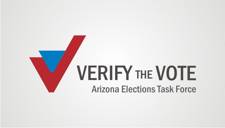BY LINDA BENTLEY | AUGUST 22, 2012
Verify the Vote AZ reveals thousands of illegally gathered signatures
We are alarmed and shocked by the rate of questionable circulators – and questionable signatures



Andrew Chavez Jennifer Wright
PHOENIX – Irregularities abound with the petitions circulated to place the Open Government/Open Elections Act ballot initiative, otherwise known as the “Top Two” primary initiative that would do away with partisan primaries as set forth in the Arizona Constitution.
Verify the Vote, an Arizona elections task force organization, armed with a cadre of volunteers, has been diligently investigating the validity of the 358,000 signatures turned in to the Arizona Secretary of State.
So far, the group has identified nearly 600 petitions were illegally circulated by convicted felons, while over 7,000 petitions were circulated by individuals whose identities could not be confirmed.
It appears felons have gathered a portion of the 9,053 petitions that have some sort of irregularities.
Those irregularities include circulators being felons convicted of fraud and forgery, as well as out-of-state circulators failing to register with the secretary of state’s office, as required by statute.
Over 600 petitions were circulated by a person, whose identity could not be confirmed, that used AZ Petition Partners LLC’s address as her residence.
AZ Petition Partners was hired to circulate petitions by the initiative’s proponents.
AZ Petition Partners’ website states:
“Signature Verification - Soon after the 2008 Initiative cycle Petition Partners went to great lengths to reevaluate AZ Secretary of State’s and County Election’s procedures. As a result, we have new and improved quality control measures to greater mirror those instituted by Election Officials. Your petition project undergoes an enhanced and rigorous Five Step verification process designed to produce the highest validity rate possible to meet your signature count requirement.”
The first of those five steps states: “Each and every petitioner is run through a nationwide criminal background check. For six years now, Petition Partners has teamed up with Tradition Investigations to handle our private investigations and background checks. Tradition uses the most advance technology and tactics in criminal investigations.”
As of Tuesday, the only number listed for Tradition Investigations was not in service.
It should be noted that AZ Petition Partners and its managing member Andrew Chavez have civil RICO (Racketeer Influenced Corrupt Organization) charges pending in Kentucky for forging signatures on petitions.
Several other circulators, whose identities could not be confirmed, used various motel and hotel addresses around the Valley for their residence.
According to state statute, a circulator is not required to be a resident of this state but otherwise must meet the state’s voter registration qualifications and, if not a resident of this state, must register as a circulator with the secretary of state before circulating petitions.
In other words petition circulators must be at least 18 years old, citizens of the United States and not be felons whose civil rights have not been restored.
Statute also requires the circulator's name to be typed or printed under the circulator's signature and include the circulator's actual residence address or, if no street address, a description of residence location.
Jennifer Wright of Verify the Vote, Arizona stated, “What we have found makes all of the signatures gathered by felons invalid. Our initial count indicates this will be in the thousands. Our investigation continues on the validity of the 358,000 signatures accepted by the secretary of state. We are alarmed and shocked by the rate of questionable circulators – and questionable signatures.”
Wright said Verify the Vote, Arizona will not file suit to boot the initiative off the ballot but would make its findings available to the media and qualified organizations interested in challenging the petition filing in court.
Of the 9,053 petitions with irregularities, 7,030 were circulated by persons who Verify the Vote, Arizona was unable to verify the identity of the circulator, based on the name and address provided by the circulator; 582 were circulated by convicted felons; 221 were circulated by individuals who did not appear to have a social security number; while the remainder failed to register with the secretary of state’s office as out-of-state circulators.
And, out of the 1,842 petitions circulated by 35 individuals who failed to register as out-of-state circulators, 53 were circulated by convicted felons, 75 were circulated by individuals who did not appear to have a social security number, and 1,004 were circulated by persons who Verify the Vote, Arizona was unable to verify the identity of the circulator based on the name and address they provided.
Of the 2,830 petitions circulated by 39 individuals who did register with the secretary of state as out-of-state circulators, 102 were circulated by convicted felons, two of the circulators are considered fugitives with active arrest warrants, 44 were circulated by individuals who did not appear to have a social security number, and 2,178 were circulated by individuals who Verify the Vote, Arizona was unable to verify the identity of the circulator based on the name and address they provided.
Of the 4,381 petitions circulated by 36 individuals purporting to be Arizona residents, 427 were circulated by convicted felons, 102 were circulated by individuals who did not appear to have a social security number, one of the circulators has pending forgery charges and the petitions submitted reflect clear instances of fraud, and 3,848 of the petitions were circulated by individuals who Verify the Vote, Arizona was unable to verify the identity of the circulator based on the name and address they provided.
Using a commonly accepted average of 11 signatures per page, Verify the Vote, Arizona estimates more than 99,000 petition signatures could be invalid.
This morning, county officials announced a review of signatures from petitions circulated in Maricopa County appear to not have a sufficient number of valid signatures for the initiative to appear on the ballot.
Due to the volume of signatures submitted, 365,486, where 259,213 were required, approximately 71 percent need to be valid for the initiative to appear on the ballot.
The average validation rate of Arizona’s 15 counties has been 78.9 percent with the lowest validation rate in a county coming in at 75 percent, except for Maricopa County, where county officials have indicated a validation rate of 67 percent.
Because Maricopa County is the state’s largest county, the low validation rate in Maricopa County could prevent the ballot from going to the ballot.
Joe Yuhas, the political consultant hired by the initiative’s backers, said, “It comes as no great surprise to us that the validation rates reported by county officials up to today closely mirror our own internal validation rate. Yet, the Maricopa County validation rate is not only inconsistent with our own internal validation review, but more importantly, it is significantly lower than that reported by all other counties.”
Former Mayor Paul Johnson, chairman of the Open Elections/Open government campaign, said, “We plan to follow the process and file the appeal. The large anomaly, what appears to be much more rigid a standard in Maricopa County compared to all other counties, and past court decisions all provides us with great confidence that additional signatures will be validated by the courts.”
Johnson went on to say, “The governor and legislature tried to put roadblocks in front of us. Next, the lobbyists and political bosses who like things just the way they are filed a lawsuit against the initiative which the supreme court threw out. This is not our first legal challenge, nor do we believe it will be our last. But the cause is too great. We’re gearing up for the next fight.”





